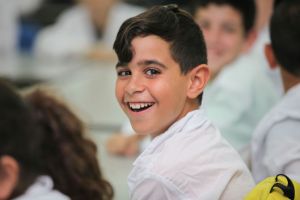People naturally care first and foremost for their family, community and country. But the Jewish people have always felt part of a larger family as well, bringing a broader perspective to issues of global impact.
We understand that problems — and solutions — do not necessarily begin or end right at the city limits or a nation’s borders. And along with a rigorous education featuring the latest science and technology, ORT schools inspire students to apply their skills on a global scale, for positive change.
Our students come to appreciate their role as citizens of Planet Earth, along with their national and religious identity. Often from disadvantaged backgrounds themselves, they‘re learning how they can make life better for others, through individual acts that add up to widespread impact.
The Covid crisis has shown how global issues require global cooperation — and how tech-savvy students can reach out to those in need.
In Moldova, a bit of ingenuity with 3-D printers helped turn old snorkel masks into much-needed protective medical gear. “We were happy that we could be engaged in something important for other people,” says ORT grad Sandu Chirita.
In Uruguay, students developed a networking app to help people find new friends with common interests, easing the enforced loneliness of those many house-bound months.
And in Israel, young tech enthusiasts at our Dimona program designed innovative clear masks enabling the deaf to once again lip-read friends and family. “We believe we can change the world, even from home,” says project leader Roi Ledany.
Change the world, heal the world — an ideal driven by the Jewish tradition of empathy and compassion. Every ORT student is encouraged to weigh the issues, seek potential solutions and then actively apply their own unique skills to change lives for the better.

The key is to first establish a global consciousness. Young people examine issues such as war and peace, poverty and prosperity or environmental survival, to grasp the inter-relationship of events around the world.
Step two is building global competencies. Students gain the technical skills to address real-world problems, with planning and organization also emphasized by ORT programs in entrepreneurship and social service.
The result might be the prosthetic arm developed by our Mexico students, or the app created by an Argentine teen to speed vital patient info to crash-scene paramedics.
Curriculum units tackle trends that know no borders. Internet freedom, cultural differences, gender-gap issues, immigration and the environment all merit wide-angle discussion.
People naturally resist some aspects of a global perspective. But while many challenges are best handled locally, others will demand global cooperation. An agricultural advance might prevent a wave of starvation, and a wave of refugees. A medical breakthrough might stop some disease in its tracks before it hops continents.
An ORT education is not simply knowledge for its own sake, but for a wider good. Drawing up some high-tech magic or simply reaching out to the elderly or raising relief supplies, ORT youngsters learn to do their part. They are ORT’s mission in action.
ORT Montreal
250-5165 Queen Mary Rd.
Montreal, QC, H3W 1X7
Tel: 514-481-2787
Toll-Free: 1-866-481-2787
Email: info@ortmontreal.org
ORT Toronto
272 Codsell Ave
Toronto, ON, M3H 3X2
Tel: 416-787-0339
Toll-Free: 1-866-991-3045
Email: info@ort-toronto.org
World ORT Headquarters
126 Albert Street
London, NW1 7NE, United Kingdom, ORT.org
Tel: +44 (0)20 7446 8500
Email: wo@ort.org
Website: https://ort.org/en/
ORT Vancouver
570 - 4105 Arbutus Street
Vancouver, B.C. V6L 0C5
Tel: 604-569-0484
Email: maryt@ortcanada.org
ORT Archive Offers Access to Historical Documents and Images
World ORT has launched a digital archive which aims to preserve historical records of the organization’s activities and to place them in the context of contemporary Jewish history.
Sign up for our newsletter to keep up to date with ORT
ORT Canada, Registered Charity Number 118834910.
272 Codsell Ave, Toronto, ON, M3H 3X2
© 2022 Copyright ORT - All rights reserved.